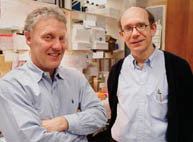
Bad mothering may produce more than therapists’ bills and tortured souls. Researchers at McGill have discovered that the behaviour of rat mothers can change the chemistry of certain genes in their offspring—and that drugs can reverse those changes.
Moshe Szyf, a professor in the Department of Pharmacology and Therapeutics, Michael Meaney, a professor in the departments of Psychiatry and Neurology and Neurosurgery, and McGill graduate student Ian Weaver became pioneers in the new field of epigenetics with a study in 2003 that showed that nurture could trump nature. The groundbreaking work revealed that the behaviour of mother rats towards their offspring created a lifelong change in the genomic marking on the DNA of the pups, causing those with bad moms to be more fearful and respond more strongly to stress.
Follow-up studies, published in 2006 and funded by the CIHR, the National Cancer Institute of Canada and the Mental Health Research Association, showed that drugs can treat behaviour-induced genetic alterations, turning back the DNA changes. In effect, organisms aren’t stuck with the genetic hand of cards they are dealt: you can influence your DNA destiny through the way you live or through treatment.
As Szyf told the Globe and Mail earlier this year, this could change how we think of our genes. “It introduces the concept of responsibility in genetics,” he said.
